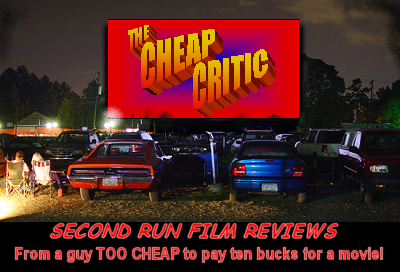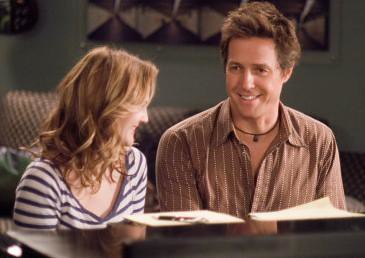
There are romantic comedies that change your life. They are movies that present a view of relations between the sexes that is so compelling and wonderful that it becomes forever part of your idea of a perfect relationship. Cary Grant and Katherine Hepburn, William Powell and Myrna Loy, Gene Kelly and Debbie Reynolds, Clark Gable and Claudette Colbert: these are all couples from romantic comedies that one never quite forgets. Hugh Grant and Drew Barrymore on the other hand, no so much.

To be fair, the cinema-literate among you will have noticed that, with the exception of Debbie Reynolds, the individuals I mentioned from life-changing romantic comedies have one thing in common: they have all grown old and died. Each and every one of the films that provided my couples is over fifty years old. It would be asking a lot of Grant and Barrymore to expect them to single-handedly restore to its former glory an industry that hasn't turned out much first-rate product since before they were born. And, by the lower standards generally applied to modern romantic comedy, they do just fine.
In the film Grant plays Alex Fletcher, a fading 1980s pop star who has been living off his once-formidable popularity for twenty years and now finds himself playing smaller and less lucrative events to an audience of aging women who remember him from their youth. His faithful and long-suffering agent tries to cast the decline in the most positive possible terms -- Yes, Six Flags has canceled the summer billing but I've got you a high-dollar Bar Mitzvah -- but Alex is quite discouraged. The one piece of really good news his agent comes up with is that Cora Corman, a sexy and very, very popular young singer, is a fan of Alex and has asked him to write a song that she and Alex can perform together on her upcoming tour. The problem is that while Alex can handle the music he has something of a tin ear for lyrics ... and he only has a week to write the song.
From there the plot unfolds exactly as you'd expect. Alex's agent finds him a lyricist with whom Alex struggles, neither of them able to come up with the right lines, until Sophie Fisher (Barrymore), a discouraged young writer who is filling in for the lady who waters Alex's plants, starts making suggestions... From there you should be able to work out the rest of the plot as easily as you can recreate the last line of a forgotten Limerick.
I like Drew Barrymore and she is very good in this part -- cute, likable, with a slightly rumpled innocence that persists despite a bit of wear and tear -- but there is nothing about the role that really calls out for her in particular. Any of a number of personable young actresses could have played the part. The same can't be said for Hugh Grant; it's hard to imagine anyone else in his role. Grant has had a long and successful career in which he has been lucky enough to spend most of his time coasting and the rest not pedaling very hard. He is a big star and an adequate actor but it is difficult to explain his popularity based on anything he has done lately. Paradoxically, this has always been true, and his character's nagging self-doubt resonates with Grant's own somewhat inexplicable success.
Now that the film is past its first release and you are unlikely to find yourself faced with a ten-dollar ticket price I can recommend the film as very much worth seeing. The music video of Alex's old band, Pop, doing their signature song, Pop Goes my Heart, is worth the price of rental all by itself. It is a gentle but highly accurate send-up of the 1980s pop music scene and Grant's (computer enhanced?) portrayal of Alex's much-younger self is fabulous. He does his own singing and he's not half bad. The contrast between the pop music of the 1980s and that of our current unnamed decade is one of the best parts of the film. From Alex's point of view the current music scene, as shown by Cora's odd, self-absorbed eastern-mystic bump-and-grind, is alien and off-putting. He worries that music has changed so much that there is no way he can fit in. The film stays very close to Alex's point of view and in the end, when there is a synthesis between the old and the new music, the result is 1980s pop with a few modern flourishes.
The film is obviously aimed at a more 'mature' audience than many modern comedies. The film pokes fun at older pop music and at current music but the older sensibilities mostly prevail. This provides an element of wish-fulfillment for the baby-boomer generation but the film is even handed enough that it should work OK for today's young people as well.
You should avoid the film if you are looking for surprises (but, if you are looking for surprises in romantic comedies, what's with that? Good luck in your search.) It also may not appeal to people with allergies to excessive niceness. The film has no villains. With one exception we are supposed to like everyone in the end. The exception is a minor fink from our heroine's back-story whose unimportance she ultimately learns to see.
Music and Lyrics won't change your life but its not a bad way to spend a couple of bucks and a couple of hours. It's enough of a chick-flick that you can see it with your lady-friend and she ought to feel she owes you a guy flick -- some sort of stupid shoot-em-up with tits, explosions and helicopter crashes -- she ought to owe you ... but she won't. But that's OK, it's not a bad way to spend a couple of bucks and a couple of hours.

No comments:
Post a Comment